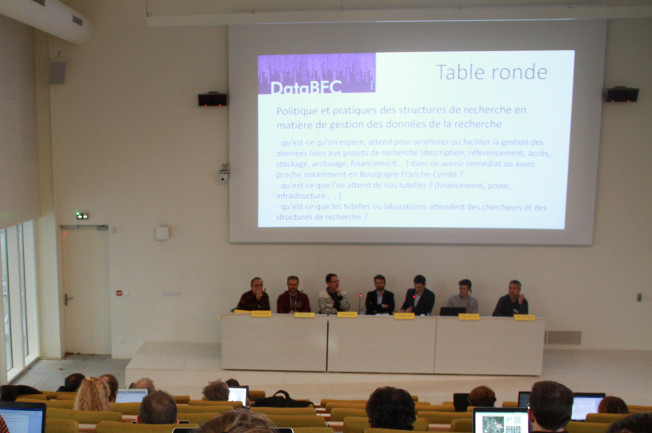The "DataBFC" colloquium took place from November 13 to 15 2017 at the Maison des Sciences de l’Homme et de l’Environnement Claude Nicolas Ledoux (MSHE) in Besançon (France). The event was jointly organized by the Observatory of Universe Sciences of Franche-Comté Burgundy (OSU THETA) and MSHE, under the auspices of the the Community of Universities and Institutions (COMUE) "Université de Bourgogne Franche-Comté".
The background of this colloquium was Open Research Data, defined in particular by European directives, the European H2020 programme and the French law for a "digital republic" ; it relied on different international, national and local experiences, among which the one of OSU THETA through the dat@OSU project.
It welcomed around 90 persons originating from different professional backgrounds (scientists, librarians, engineers, lawyers, ...), as well as from many disciplinary (Earth and Universe sciences, Humanities and Social Science, Environmental Sciences, Physics, Mathematics, …) and geographical (Burgundy Franche-Comté, Paris, Montpellier, Bordeaux, Lyon, Chambéry, Nancy, Strasbourg, Saclay, Lausanne, …) origins. This colloquium aimed at initiating a synergy about data openness and management of research data in Burgundy Franche-Comté, but was of concern to a much broader audience, which underlines the significance of this topic.
Four types of sessions were proposed :
- general talks about research data by speakers intervening at the international or national levels ;
- a round table discussion with representatives of laboratories and local research structures to exchange about their policies and practices ;
- experience feedbacks of projects in Burgundy Franche-Comté about research data management ;
- a poster session.
The 16 talks were made by representatives of international, French or Swiss organisations, whose implication in research data management is recognized, such as the CNRS Directorate for Scientific and Technical Information (DIST), the National Institute for Scientific and Technical Information (INIST), the National Informatics Centre for Higher Education (CINES), the BBEES joint service unit (UMS BBEES), the Research Data Alliance, DataCite, the astronomical Virtual Observatory, the great infrastructure of research for Humanities and Social Sciences (TGIR Huma-Num), the Swiss Data Science Center, and local structures such as OSU THETA, MSHE, Chrono-environnement, the UTINAM Institute, Biogéosciences, the Laboratoire Interdisciplinaire Carnot de Bourgogne, the long term ecological research site Jurassian Arc (ZAAJ), ... The slides media of most talks are available on the colloquium web site.

The presentations allowed to address the different components of the data life cycle (Planning, Collection, Analysis, Documentation, Storage, Preservation, Display, Reuse) and to underline the key role of high quality data, identified as the FAIR data (Findable, Accessible, Interoperable, Reusable) [1]. Scientists and research institutions can thus promote their data while keeping on curating them.
To get such data, it is essential to set up Data Management Plans (DMP) from the beginning, to use good practice guidelines and to use professional skills (information and computer scientists, librarians, ...) and experience sharing through professional, technical and displinary networks.
Contact for more informations : databfc chez sciencesconf.org
Voir en ligne : DataBFC - opening and managing research data in Burgundy Franche-Comté






